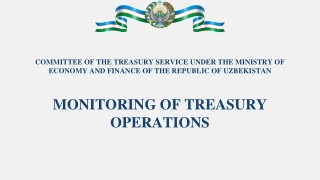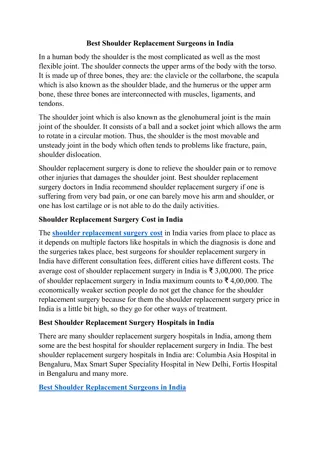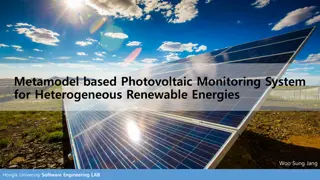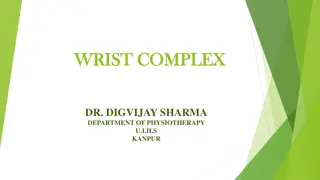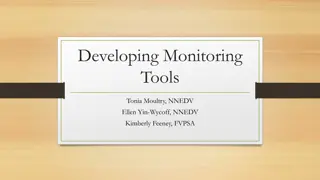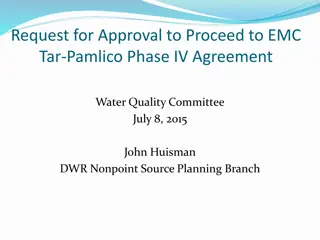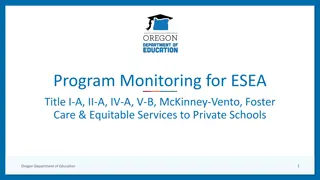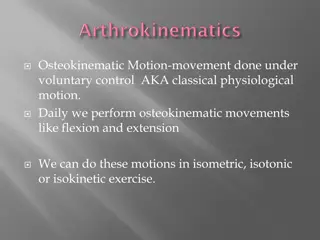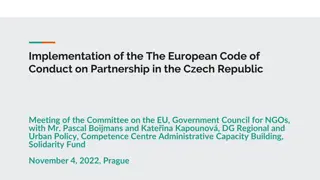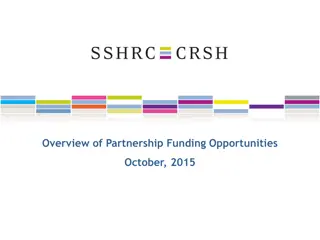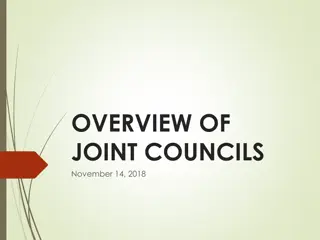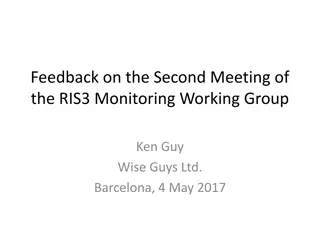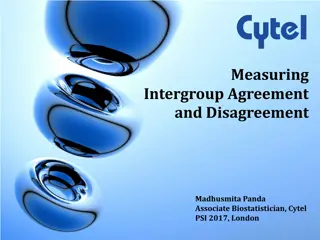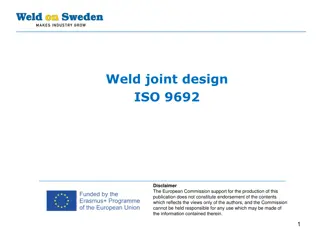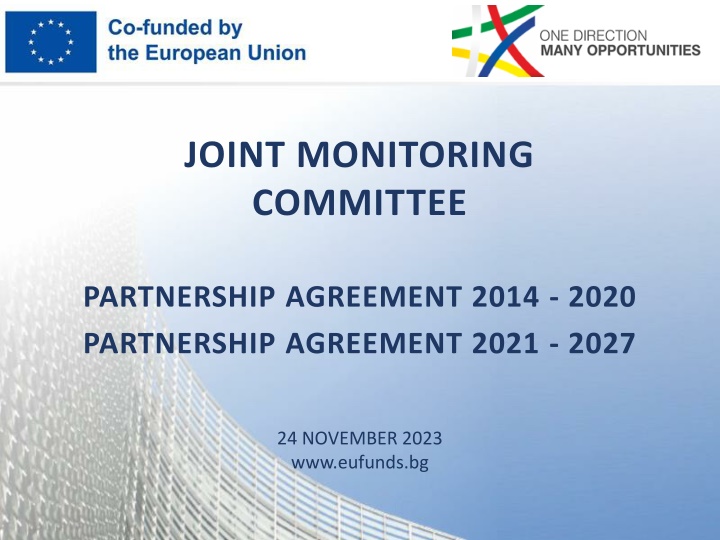
Joint Monitoring Committee Partnership Agreement
This content provides insights into the implementation progress and achievements of the Joint Monitoring Committee Partnership Agreement, highlighting financial data, lessons learned, and the implementation of operational programs in the transport and environment sectors.
Download Presentation

Please find below an Image/Link to download the presentation.
The content on the website is provided AS IS for your information and personal use only. It may not be sold, licensed, or shared on other websites without obtaining consent from the author. If you encounter any issues during the download, it is possible that the publisher has removed the file from their server.
You are allowed to download the files provided on this website for personal or commercial use, subject to the condition that they are used lawfully. All files are the property of their respective owners.
The content on the website is provided AS IS for your information and personal use only. It may not be sold, licensed, or shared on other websites without obtaining consent from the author.
E N D
Presentation Transcript
JOINT MONITORING COMMITTEE PARTNERSHIP AGREEMENT 2014 - 2020 PARTNERSHIP AGREEMENT 2021 - 2027 24 NOVEMBER 2023 www.eufunds.bg
IMPLEMENTATION OF THE 2014 2020 PROGRAMMES: ACHIEVEMENTS, CHALLENGES AND LESSONS LEARNT
IMPLEMENTATION OF OP TRANSPORT AND TRANSPORT INFRASTRUCTURE 2014 2020 Martin Georgiev Director, Head of MA of OPTTI
Implementation Progress: Financial Data /as of 15 November/ Contracted funds: EUR 1 802 743 573,88 (102,51% of the OPTTI budget) Payments to beneficiaries: EUR 1 307 586 154,96 (74,36%) Verified expenditure: EUR 1 217 491 870,44 (69,23%) Certified expenditure: EUR 1 211 059 763,36 (68,87%) Funds reallocated to SAFE-related operations: EUR 145 million euro (EUR 140,5 million CF and EUR 4,5 million ERDF) MA estimation of the residual risk of incomplete absorption: the measures that have been taken to optimize implementation (phasing, additional projects and SAFE) currently contribute to the complete elimination of any residual risk
Lessons Learnt Need of better budgeting in the elaboration of project proposals, providing opportunity for adequate response in the event of significant changes in the environment /e.g. disruptions in the supply chains, a significant increase in market prices during a long implementation period of the activities, etc./ Setting a feasible scope of activities, avoiding mega-projects that are extremely complex to manage and difficult to change in the event of objective circumstances requiring their modification. If possible at the stage of the tender procedure - attracting a larger number of contractors, for objects of lower value, with the possibility of effective coordination of the processes / hides another risk: more participants - a more complex coordination process, but in case of failure this doesn t stop the whole project/ Maintaining a serious reserve of mature projects that can be promptly included in the scope of the programme if necessary /incl. over- contracting as an option/
IMPLEMENTATION OF OP ENVIRONMENT 2014 2020 Galina Simeonova Director General, Head of MA of OPE
Implementation Progress: Financial Data /as of 15 November/ Contracted funds: EUR 1 934 752 753 Payments to beneficiaries: EUR 1 239 911 103 Verified expenditure: EUR 1 129 521 222 Certified expenditure: EUR 1 085 257 618 Funds reallocated to SAFE-related operations: EUR 144 900 000 MA estimation of the residual risk of incomplete absorption: EUR 33 million Union Contribution
Lessons Learnt The late announcement of public procurement for main project activities in the period 2014-2020 led to serious delays in implementation, therefore for the new programming period 2021-2027 in the application conditions to the procedures, the MA sets requirements for announced public procurement The set goals in financial and physical aspects in the period 2021- 2027 are aligned with the pace of implementation of the project activities PE 2021-2027 builds on and complements the results achieved in the 2014-2020 programming period
IMPLEMENTATION OF OP REGIONS IN GROWTH 2014 2020 Angelina Boneva Deputy Minister, Head of MA
Implementation Progress: Financial Data /as of 15 November/ Contracted funds: EUR 1 606 273 676,49 Payments to beneficiaries: EUR 1 315 268 720,83 Verified expenditure: EUR 1 110 940 379,77 Certified expenditure: EUR 1 097 089 564,33 Funds reallocated to SAFE-related operations: EUR 88 865 494,00 MA estimation of the residual risk of incomplete absorption: EUR 1 942 408,37 Union contribution
LESSONS LEARNT Force Majeure: the global crisis caused by COVID-19 and the war in Ukraine the economic crisis and inflationary processes cost indexation Necessary measures for the successful implementation of the projects: Appointing a project management team with relevant experience and administrative capacity Timely announcement of public procurement for the selection of contractors Continuous monitoring of the actual implementation of the activities, the set deadlines and the achievement of the project indicators Taking timely corrective action Completion of projects in the last year of Programme implementation
IMPLEMENTATION OF OP INNOVATION AND COMPETITIVENESS 2014 2020 AND OP SME INITIATIVE Iliyana Ilieva Deputy Director General, MA of OPIC and OPSMEI
Implementation Progress: Financial Data /as of 15 November/ Contracted funds: OPIC: EUR 1 704 943 073 OPSMEI: EUR 102 000 000 Payments to beneficiaries: OPIC: EUR 1 501 537 184,42; 90,35 % of the Programme budget OPSMEI: EUR 102 001 564,57; 100% of the Programme budget Verified expenditure: OPIC: EUR 1 603 765 943,47; 96,50 % of the Programme budget OPSMEI: EUR 102 001 564,57; 100% of the Programme budget Certified expenditure: OPIC: EUR 1 447 406 097,99; 87,10 % of the Programme budget OPSMEI: EUR 102 001 564,57; 100% of the Programme budget Funds reallocated to SAFE-related operations: EUR 53 149 882 MA estimation of the residual risk of incomplete absorption: Full absorption of the funds under the programs is foreseen.
Lessons Learnt Seeking dialogue and reaching consensus among partners and stakeholders Strengthening of administrative capacity digitalisation of the MA activity, improvement of data processing and analysis skills, better planning of measures Responsiveness and ability to quickly adapt to changes in the environment (consequences of COVID-19, war in Ukraine and subsequent refugee and energy crisis) Flexible approach respecting market realities and ESIF rules Wider use of external experts with necessary technical knowledge and experience in project evaluation and monitoring Continue the approach of reducing administrative burden and widening the use of simplified costs options Need to strengthen capacity to use financial instruments at national level
IMPLEMENTATION OF OP HUMAN RESOURCES DEVELOPMENT 2014 2020 Nikolay Naydenov Deputy inister of Labour and Social Policy
Implementation Progress: Financial Data /as of 15 November/ Contracted funds: EUR 1 421 963 938 Payments to beneficiaries: EUR 1 286 812 942 Verified expenditure: EUR 1 276 137 968 EUR 986 626 191 under ESF EUR 111 480 056 under YEI UR 178 031 720 under REACT-EU Certified expenditure:1 254 302 512 EUR EUR 966 691 320 under ESF EUR 111 390 318 under YEI UR 176 220 874 under REACT-EU Funds reallocated to SAFE-related operations: EUR 25 243 317 Assessment of the MA for the residual risk of incomplete absorption: No risk of de-commitment, as the certified expenditure level has reached 91,53% of the budget
Lessons Learnt Wider use of simplified cost options compared to the previous programming period Reduce the administrative burden by both the Beneficiaries and the MA Minimized errors Focus on the result
IMPLEMENTATION OF OP SCIENCE AND EDUCATION FOR SMART GROWTH 2014-2020 Ivan Popov Deputy Executive Director, MA of OP SESG
Implementation Progress: Financial Data /as of 15 November/ Contracted funds: EUR 701 311 950 Payments to beneficiaries: EUR 619 526 464 Verified expenditure: EUR 557 142 661 Certified expenditure: EUR 541 070 669 EUR 136 603 888 under ERDF EUR 364 092 268 under ESF EUR 40 374 513 under REACT-EU Funds reallocated to SAFE-related operations: EUR 24 000 000 EUR 18 950 497 under ERDF EUR 1 000 000 under ESF EUR 4 049 503 under REACT-EU Assessment of the MA for the residual risk of incomplete absorption: EUR 2,25 million under ERDF, and no risk is identified under the ESF and REACT-EU
Lessons Learnt ERDF Public procurement and construction-related activities: Preparing annual analyzes of the most frequently committed mistakes and conducting trainings for the beneficiaries A trend towards reduction in the number of the irregularities ESF COVID-19: Activities related to training and mobility of students, professors. Application of simplified cost options (ESF) A significant reduction in the administrative burden for both the beneficiaries and the Managing Authority Very low error rate, rather isolated and individual Application of de-minimis for NGOs in the Education sector
IMPLEMENTATION OF OP GOOD GOVERNANCE 2014 2020 Daniela Nikolova Head of Department, MA of OPGG
Implementation Progress: Financial Data /as of 15 November/ Contracted funds: EUR 283 836 550 (101,4%) Payments to beneficiaries: EUR 248 571 198 (88,8%) Verified expenditure: EUR 245 155 423 (87,6%) Certified expenditure: EUR 241 375 868 (86,2%) Funds reallocated to SAFE-related operations: EUR 3 466 125 MA estimation of the residual risk of incomplete absorption: No decommitment is expected at the closure of the programme. The programme has been over-contracted in order to cover the savings from projects under implementation.
Lessons Learnt Application of a strategic approach to programme interventions Close partnership with stakeholders in the overall process of programme management and implementation A need: for political consensus on policies and their sustainability over time including coordination and joint work between the executive and the judiciary in the justice sector to strengthen the capacity of the administration for ICT projects implementation and improving the public procurement process to improve the monitoring mechanism of the strategic documents that shape the measures and more active involvement of stakeholders throughout the life cycle of strategies for realistic time planning of the operations given the scope, complexity and potential risks for their implementation to set specific preconditions to boost and guarantee the implementation of the operations
IMPLEMENTATION OF FOOD AND/OR BASIC MATERIAL ASSISTANCE OP 2014 2020 Nikolay Naydenov Deputy Minister of Labour and Social Policy
Implementation Progress: Financial Data /as of 15 November/ Contracted funds: EUR 161 842 652.34 (99.98%), of which EUR 38 531 039.82 under the REACT-EU mechanism. Payments to beneficiaries: UR 161 841 993.39 (99.98%), of which UR 38 531 039.82 under the REACT-EU mechanism. Verified expenditure: UR 161 842 652.34 (99.98%), of which UR 38 531 039.82 under the REACT-EU mechanism. Certified expenditure: UR 161 842 652.34 (99.98%) MA estimation of the residual risk of incomplete absorption: 0,02% of the programme budget
Lessons Learnt The successful implementation depends on: Human resources to ensure an effective work cycle at all levels of programme management and implementation; Simplifying programming and management and reducing the administrative burden for the Managing Authority and partner organizations; High level of synergy, complementarity and coherence with national poverty reduction policies.
IMPLEMENTATION OF THE RURAL DEVELOPMENT PROGRAMME 2014 2020 Elena Ivanova Director, MA of RDP
Progress in implementation: Financial data /as of 15 November/ Contracted amounts: EUR 3 394 832 289 (89.5%) Payments to beneficiaries: EUR 2 496 027 271 (65.8%) Verified expenditure*: EUR 2 496 629 145 (65.8%) Certified expenditure**: EUR 2 076 703 020 (66.4%) Amount yet to be paid under the 2023 target: EUR 163 196 163 MA estimation of the residual risk of incomplete absorption: between EUR 30 and 70 million EAFRD * Total authorized expenditures from the SF "Agriculture " ** Expenditure declared to the EC for reimbursement + 3% advance
Lessons Learnt Improving the planning process in view of equal distribution of the implementation of investment intentions; Starting on time of training measures and provision of advisory services with a view to improving the knowledge and skills of agricultural producers throughout the period; Creation and implementation of risk management tools in agriculture for effective response in case of crises and natural disasters; Creating opportunities to provide financing for the investment intentions of agricultural producers, including young, small and new farmers; Reduction of the administrative burden for the candidates, including by digitalisation of processes.
IMPLEMENTATION OF EUROPEAN MARITIME AND FISHERIES FUND OP FOR BULGARIA 2014 2020 Boryana Vodenicharska State Expert MA of MFP
Implementation Progress: Financial Data /as of 15 November/ Funds committed: EUR 94 530 814 Payments to beneficiaries: EUR 70 042 286 (incl. advance payments) Verified expenditure: EUR 67 461 767 Certified expenditure: EUR 62 563 142 Measures taken by the MA to mitigate the risk of incomplete absorption: Shortened contracting deadlines Launch of new calls amounting to EUR 9.4 million Compensations for the consequences of the war in Ukraine: EUR 6.14 million + additional calls amounting to EUR 6.29 million by the end of 2023 Reallocated funds to reserve list projects under CLLD strategies amounting to EUR 0.92 million With the implementation of the above actions the residual risk is estimated to drop below 8.1% or EUR 6.55 million, EMFF funding
Lessons Learnt Increasing the capacity of the potential beneficiaries for project preparation Facilitating private beneficiaries in procedures for selection of contractor Reducing the administrative burden for beneficiaries Introduction of SCOs Prompt reaction of MA in crises and unexpected changes in order to support the sector in a timely manner Timely implementation of FIs under the Programme

